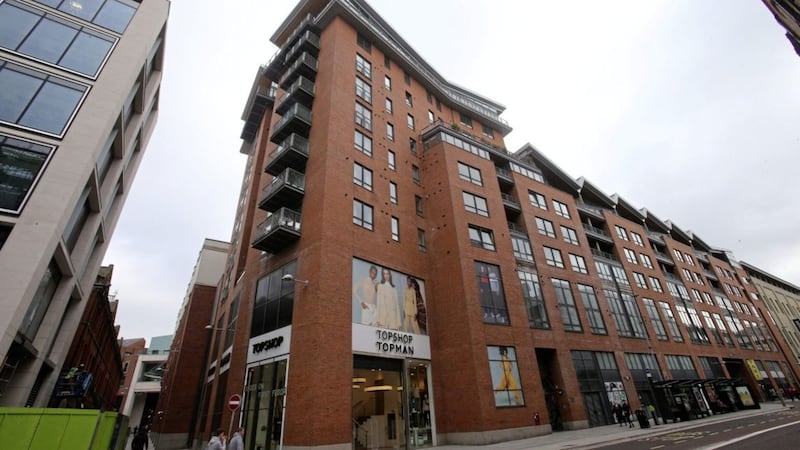Legislation on defective buildings is to be introduced to increase the time limit for owners to bring compensation claims, Communities Minister Gordon Lyons has said.
Mr Lyons announced plans to bring the law in line with England and Wales following a controversy around the Victoria Square apartments in Belfast.
Residents of the city centre complex had to leave their homes in 2019 after structural issues were found.
However, their bid for compensation was struck out in court last month because in Northern Ireland such claims must be made within six years of a building being completed.
Assembly members have faced calls to change the law to extend the statutory time limit to 30 years, the same as in England and Wales.
Mr Lyons told the Assembly: “I intend to bring to the Assembly, as a matter of urgency, legislation to provide the same protection associated with defective premises for citizens in Northern Ireland as afforded elsewhere in the UK.
“This proposed Bill will introduce new provisions into the Limitation (Northern Ireland) Order 1989, establishing a retrospective period of up to 30 years and a prospective period of up to 15 years in which a party can take action for defective premises.”
Mr Lyons added: “In order for us to continue to deliver for people here, I am seeking the ongoing urgent support of my Executive colleagues and this Assembly to ensure the swift passage of this legislation which will provide Northern Ireland residents with the same recourse and protections as prescribed in other jurisdictions where a building is shown to be defective.
“Given the urgency, I am writing to Executive colleagues today to seek their support and approval to introduce new legislation under the Accelerated Passage process.
“This primary legislation will address the period under which action can be taken with regard to defective buildings and addresses the unfair disparity that currently exists and disadvantages our people.”
Mr Lyons said the current disparity in laws places people in Northern Ireland at a “clear disadvantage” compared with the rest of the UK.
He said: “It is clear there is an urgent need for fit-for-purpose legislation which provides improved protection to all those who live in Northern Ireland.”
Mr Lyons said it was initially “unclear” which department should take on responsibility but, after discussions with the Agriculture, Environment and Rural Affairs Minister Andrew Muir last week, the transfer of functions order has been moved to his department.
Opposition leader Matthew O’Toole welcomed Mr Lyons’ statement.
“We always said that we would be constructive and welcome progress where Executive ministers made it, so I do commend this and I thank you for bringing it to the House and working collaboratively with your colleagues to act swiftly on it,” he said.
He asked whether the legislation would allow the Victoria Square residents to reopen their case or take fresh legal action.
Mr Lyons responded: “This legislation came about due to the fact that there is a disparity between Great Britain and Northern Ireland. Certainly I think that the High Court case highlighted the disparity that exists.
“He will understand that it is inappropriate for me to comment on ongoing civil matters but I think it is a positive thing today that we’re dealing with that disparity that exists currently between different parts of the UK.”
Last month, it was announced that residents of the Victoria Square apartments would be issued with refunds for the rates bills they had paid during the period when their properties were uninhabitable.
Their legal bid for compensation was struck out in Belfast High Court after the judge ruled it fell outside the terms of existing legislation.
The case had been taken against architects involved in the design and two building companies. All deny any liability.
Residents had to leave their homes in 2019 after a defect was identified in a structural column. They have been unable to return, but are still subject to paying certain bills, such as rates.
A charity, Ulster Garden Villages, owns 54 of the 91 apartments. The remaining properties are owned by individuals.







